
Quantum Computing
Microsoft’s Station Q Sydney investment intensifies global effort to build a quantum economy
Creating a useful, scalable quantum computer is one of the greatest scientific challenges facing mankind. It also presents one of our greatest opportunities.
The prospect of a new generation of quantum computing technology could radically transform our approach and pace for tackling the world’s biggest problems: how climate change is tackled, how drugs are developed, and the way that communications are secured.
This dramatically expanded spectrum of what we can achieve through computing would set the stage for an entirely new era of human innovation that will usher in a societally transformative “quantum economy.”
A deep partnership forged between Microsoft and the University of Sydney, led by David Reilly at its scientific helm, will see Australia play an important role in the quantum computing field and emerging quantum economy, fostering skills, strengthening research and forging critical industrial connections that will ensure the nation is well-positioned for the coming quantum era.
Today, the partnership is boosted with the signing of a multi-year global partnership agreement between the University and Microsoft which reinforces Sydney’s significance in the fast-paced, international quantum computing field.
Microsoft has committed to a new, long-term phase of its investment at the University which will manifest itself in state-of-the-art facilities; the establishment of specialized quantum equipment and tools; and the recruitment of research engineers, hardware engineers, and other technical staff to partner with scientific talent from the University of Sydney – all starting now.
Reilly is an experimental physicist working at the intersection of quantum science, nanoscale condensed matter systems, electronics, and cryogenics with a clear intent to build workable commercial devices that bring quantum computing out of the laboratory and into the real world.
He joined Microsoft late last year as the Scientific Director of Station Q Sydney, the Australian arm of Microsoft’s global Station Q initiative to create a useful, scalable general-purpose topological quantum computer. The Sydney Station Q team is one of only four experimental Station Q teams in the world alongside Purdue University, Delft University of Technology, and the University of Copenhagen.
Station Q Sydney is co-located with the University of Sydney’s $150 million Nanoscience Hub, home to some of the world’s leading scientists focussed on this area. With Microsoft’s support, a global bench of premier scientists and engineers will be brought together, all charged with the goal of changing computing forever.

Quantum impact
Classical computers are binary where everything is represented essentially as a 0 or 1. While today’s classical computers are already extraordinarily powerful, quantum computers seek to exploit the very nature of matter and dramatically turn the dial.
Instead of being limited to a binary representation, in quantum computing, each qubit can be 0, a 1, or any state in between.
When this can be scaled, it will be possible to perform not just one calculation at a time based on the 0 and the 1, but huge volumes of calculations performed in parallel and simultaneously. The more qubits, the greater the power.
Qubits, however, are difficult to build and maintain, and so, scientific debate rages about the best approach to create and sustain them. What is clear though is that, at present, qubits can only be created in very low temperature, low noise environments.
That’s exactly what the University of Sydney’s Nanoscience Hub has been designed for – to create an environment where the building blocks for quantum computers can be developed and tested.
David Reilly is not an ivory tower scientist – his ambition, shared by Microsoft, is to see the technology emerge from laboratories and universities and form the basis of scalable, fault-tolerant quantum machines and devices that will have real-world impact. Station Q will also play an important foundational role in establishing and growing Australia’s own quantum economy.
It is no coincidence that Station Q Sydney is co-located with one of Australia’s leading universities. As Reilly notes, “It is critically important. You are not going to build a quantum economy without a workforce – and training that generation of people is something best done at universities.”
Building a strong team with a broad vision and deep core competencies positions Station Q Sydney at the forefront of the development of a robust and resilient quantum economy
Led by Reilly, the team will take a deeply pragmatic approach to the opportunity, looking at how tried and tested elements of classical computing can work together with quantum computing.
“What makes Sydney unique is that most of our work is in bridging the quantum and classical domains,” says Reilly.
“Today we don’t have the classical technology that can go the distance in controlling a quantum computer, so to build a quantum machine needs a dual revolution, advancing the quantum devices but also all the classical infrastructure and a sophisticated electronics at their interface. We need to answer fundamental questions about how quantum and classical systems come together and how they scale.”
“At Sydney, we are leading that effort of knowing what a scaled up quantum machine looks and works like. We are focused on the transition from science to systems-level abstractions and solving what issues emerge as we scale from basic building blocks and basic demonstrations to switching quantum computing ‘on,’ from an engineering and applied physics perspective.”
The partnership forged and now extended between the University and Microsoft supports both open, discovery-led research and the development of a pathway to build and optimise commercial devices.
“Quantum computing will be incredibly powerful and will have a huge impact on the world’s problems,” says Reilly, adding that the University of Sydney is, in tandem to the science, exploring the potential impacts and ethical considerations surrounding the application of quantum computing to real world issues.
This is hard science with hugely important outcomes. Professor Reilly contextualizes that, “The University of Sydney’s stature combined with the backing and international reach of Microsoft has acted as a research magnet, attracting engineers and scientists from around world. It is also a key element of a global quantum computing initiative being championed by Microsoft.
“For Australia, this is about creating a future quantum economy. We are creating jobs now – but also bolstering our industrial profile in massively transformative technology which will have a long tail of positive impact for decades to come,” says Reilly, adding that it is time for Australian tech and manufacturing to be early movers in carving out an important niche in the emerging quantum economy.
Reilly notes the long partnership between University of Sydney and Microsoft in quantum computing adding that this new phase in the two organisations’ collaborative partnership “creates the environment and conditions for quantum computing to flourish – right here in Sydney.”














